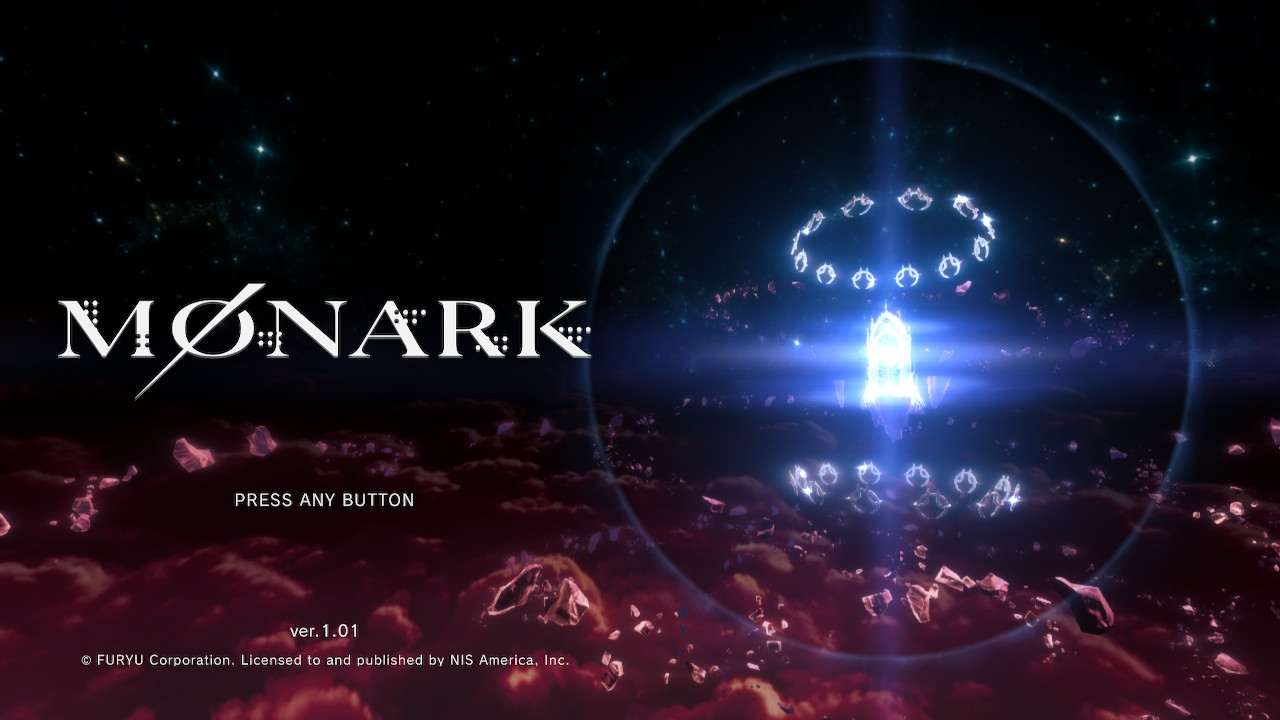Monark
Nintendo Switch
Developed By: FuRyu, Lancarse LTD
Published By: NIS America
Category: Adventure, Role-Playing, Strategy
Release Date: 02.22.22
Composers: Tsukasa Masuko, Iori Kanzaki, Mao Sasagawa, Parsley Onuma, Takayan, NILFRUITS, Kanaria, rionos, Hifumi, TOTA KASAMURA
Monark opens with the game’s protagonist getting stabbed to death after losing an unwinnable battle. Luckily, that’s not a portent of things to come in this strategy RPG. Supernatural high school RPGs have a hard time avoiding comparisons to the Megami Tensei series, whether fair or unfair. Monark comes by its comparisons more fairly than most, as it shares a scenario writer and composer. This results in some definite similarities in the narrative, but the gameplay has few significant common elements. Nonetheless, Monark provides a compelling – if disjointed – story and engaging – if repetitive – gameplay.
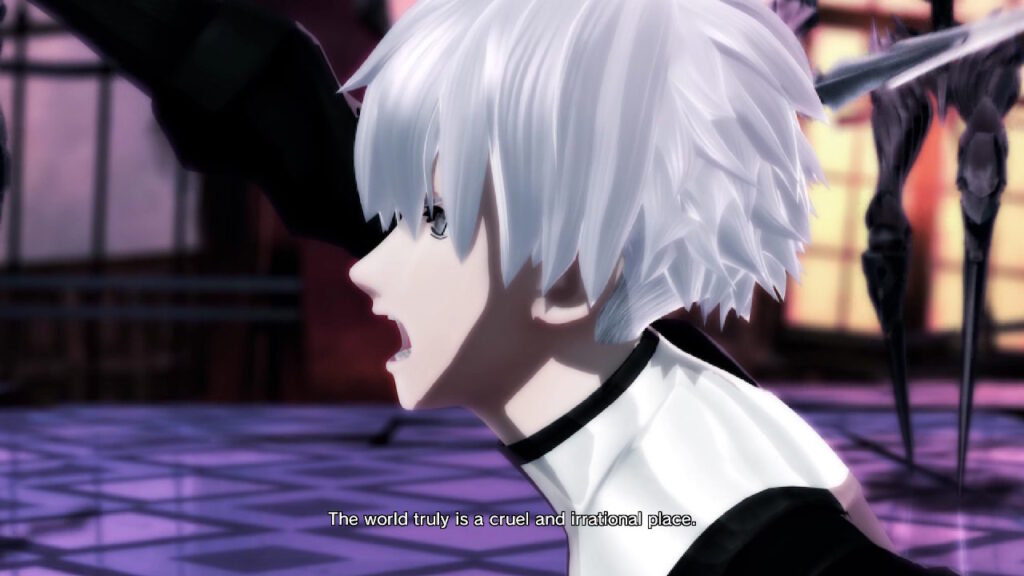
Total Monarky
Shin Mikado Academy is covered by a giant, supernatural dome. Many of its buildings are filled with supernatural mist which drive anyone who has too much exposure insane. The game’s protagonist gets pulled into the Otherworld, where he is immediately slain and then wakes up with amnesia. He discovers he has the ability to travel to the Otherworld via his smartphone and don Imagigear to combat the skeleton monsters he finds there. Using his newfound powers, he is drawn into a struggle with the seven Monarks of the Underworld, each named for one of the seven deadly sins. The Monarks have made Pacts with seven Pactbearers in the real world, and it is the protagonist’s job to break those pacts, clear the mysterious mists, and reconnect Shin Mikado with the real world.
While the story does have some striking thematic similarities to the Megami Tensei series, it does manage to establish its own identity. I mean, sure, it generally follows the established JRPG formula of teens fighting the ultimate evil while discovering the power of friendship, but it’s a good formula. Monark features great characters with relatable, interesting arcs, but unfortunately because of the way the game sets up its party organization, you can only bring one partner with you at a time. Engaging interplay between characters is one of the main attractions of a great JRPG, and by limiting your party members Monark limits its ability to create those interactions.
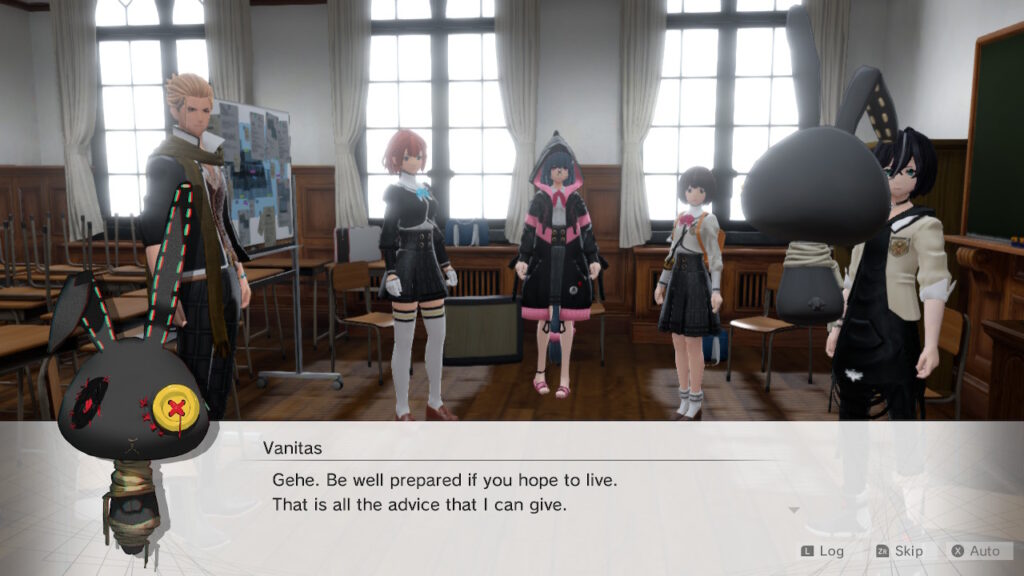
Big Man On Campus
The actual gameplay is split between exploring Shin Mikado Academy and combat. Exploration is pretty stragithforward, for the most part. You wander around the different floors of the school’s many buildings, trying to avoid staying in the mist too long. Being in the mist increases your madness level – if it reaches 100%, you fall unconscious and return to the school’s infirmary. Each floor has an objective to smash to get you one step closer to one of the Pactbearers, which is usually hidden behind a blocked door. You’ll have to figure out how to convince mist-crazed students to move, find keys, or solve puzzles to find your hidden objective.
You can also collect crystals called alter egos after meeting the student or faculty member connected to it, and documents to find that fill in the game world’s lore and backstory. Overall exploration is fairly satisfying, but some arbitrarily gated rooms stifle the satisfaction of exploring the school slightly. I’m not talking about locked rooms with bonus treasure inside; I’m talking about main rooms that aren’t even locked but can’t be opened anyway.
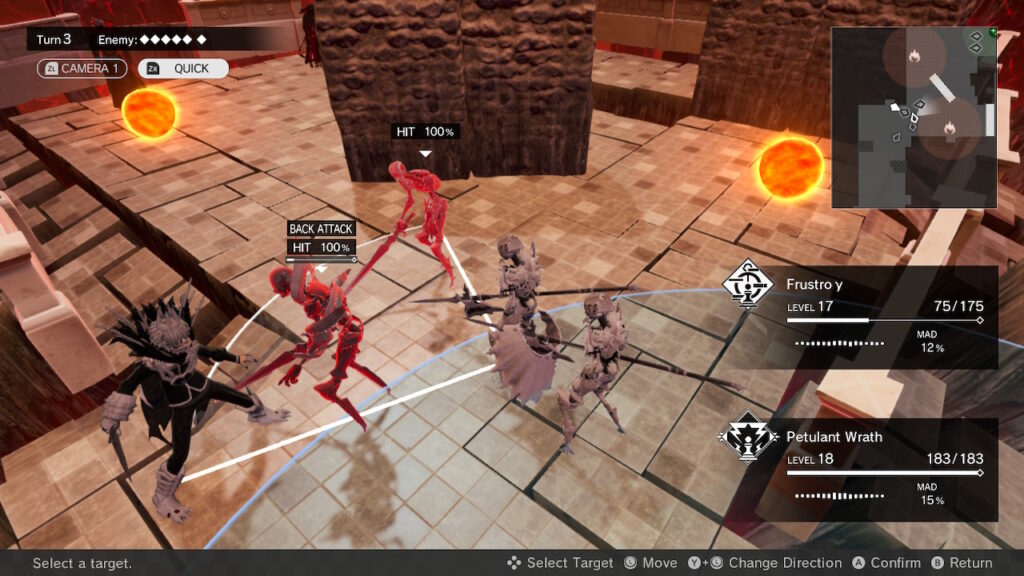
Otherworld Fight Club
In concept, the combat has a lot of interesting possibilities. Combat is turn-based – first you go, then the enemy, and so on until the enemy is out of units or the protagonist falls. Units move around within a movement radius, and can attack any enemy unit within the radius of their attacks. You can also choose to wait, which heals a small amount of health, or resolve, which increases your awakening level. If your awakening meter hits 100%, you enter an awakened state where your attacks are stronger and you have access to special abilities. Attacks can also affect your madness level; if a unit’s madness hits 100% you lose control of that unit, but it gets insanely strong. If your madness and awakening both hit 100%, you become enlightened, and unlock your strongest abilities.
The whole enlightenment deal is pretty cool in concept, but in practice it’s fairly impractical. In most battles, it’s just not worth the trouble to power up both of those meters. Non-boss battles are just too easy to spend the extra turns filling the meters. Boss battles have pretty huge difficulty spikes, which is a nice change of pace, but if you’re under-leveled, you’re really not going to be able to survive long enough to achieve enlightenment. The solution is to grind – but grinding to an appropriate level pretty much negates the need to achieve the enlightened state to begin with.
Luckily, grinding is fairly easy; there are no random battles. You receive special numbers to dial from your smartphone/main menu. You can dial them any time you want, so you don’t have to wander around waiting for random fights to grind out levels. The best part is that once you clear a battle, the game lets you immediately restart the fight after you clear it. So you can pretty much go straight from fight to fight without any unnecessary menus. It’s a very efficient and convenient way to set up grinding – but it is still grinding. It gets old eventually, especially if you need to grind a lot to tackle a difficult boss.
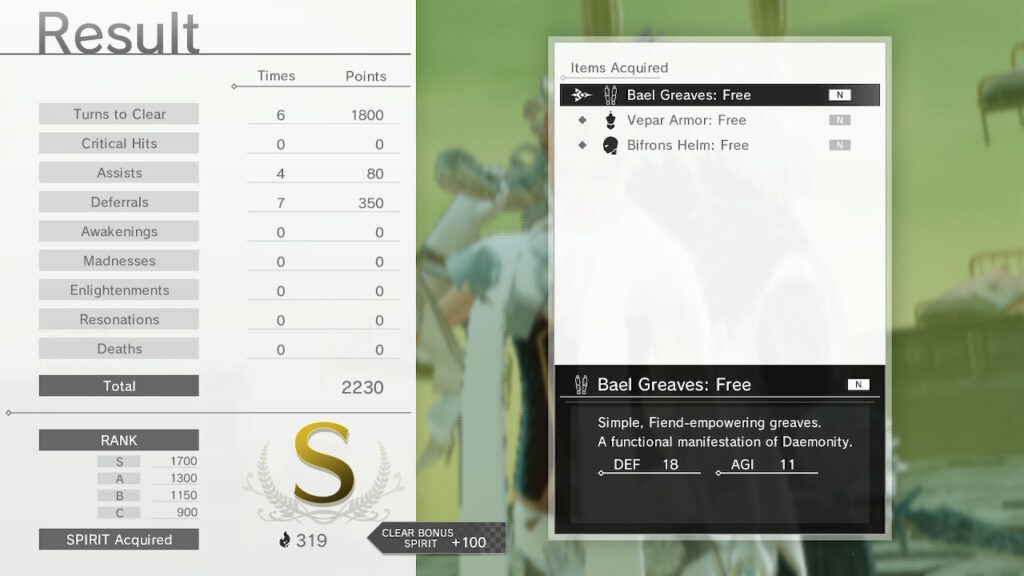
Ability Tree
Leveling up in Monark is a fairly unique process. You don’t level up by gaining experience points which directly unlock levels. Instead, you gain a level every time you use Spirit to buy an ability on your character tree. You get Spirit from defeating enemies in battle, completing achievements, or finding it during exploration. It’s a satisfying way to level up, as you gain abilities that expand your tactical options while strengthening your character.
The weakness is that you have one Spirit pool for the whole party so you have to spend your Spirit wisely. It becomes too easy to focus on one character, which makes it inconvenient to try to switch up your partner. You need to do a lot of extra grinding to catch your new partner up to where they need to be. You have fiends as additional generic party members, but they’re just blank slates that can only be used in combat. I would much rather have dropped the fiends and brought the named characters along as a full party.
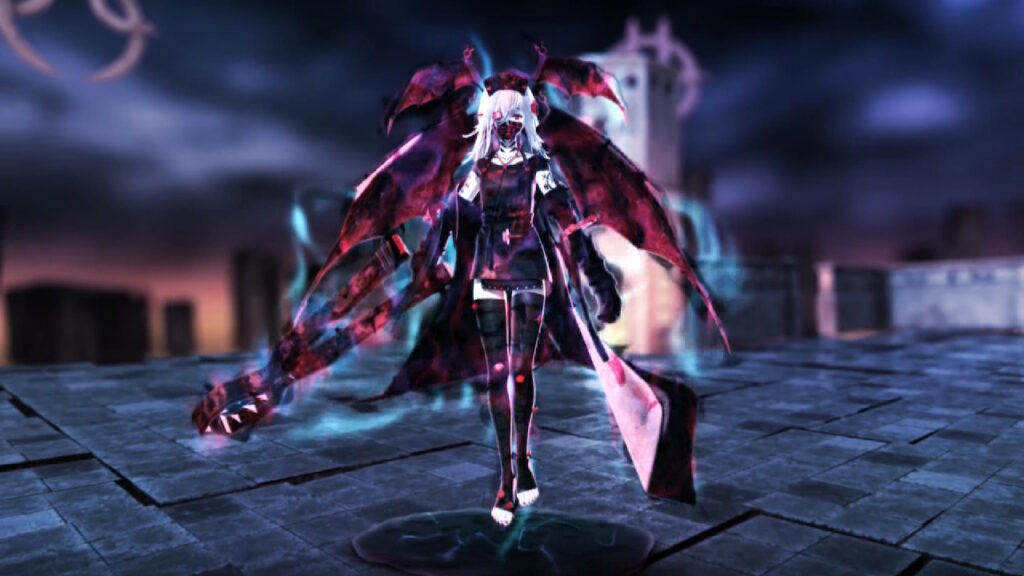
Shin Mikado Art Club
Monark’s graphics are mid-level – not great, not terrible. On the Switch it looks like a PS3-era game, for a frame of reference. Things are pretty grey and dim, which fits the game’s themes and setting, but it makes everything look dull. The fact that all of the NPCs are wearing the same clothes and all of the non-boss enemies have the same basic model makes things blend together visually. The player characters and bosses have great individual designs, but overall things look repetitively boring. The music, on the other hand, is uniformly great. It’s a good mix of atmospheric background music and some awesome J-Rock and J-Pop songs for special battles.
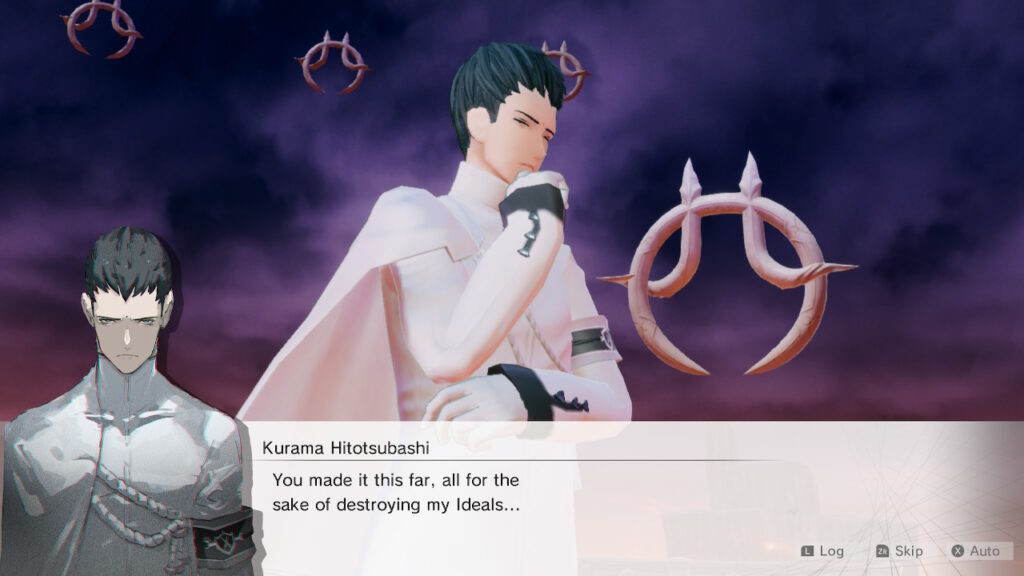
Visit An Otherworld
I really liked a lot of what Monark had to offer. The story is engaging and the game world has deep and interesting lore. I connected with the characters and felt invested in their personal journeys. The battle and character development systems had some fresh ideas and interesting elements. Unforunately, the difficulty spikes in the game necessitated grinding too much to make those interesting ideas viable in battle. Moreover, the character development system only compounds the need to grind out levels endlessly. Add in some frequently dull visuals, and Monark drops from a great game to just a good one. Still, if you’re a strategy JRPG fan, there’s plenty here to keep your attention.





Buy Monark
Digital/Physical – $59.99
Follow NIS America

The Switch Effect was graciously supplied a code for review purposes.
[Review] KONOSUBA – God’s Blessing on this Wonderful World! Love For These Clothes Of Desire! – Nintendo Switch

Developed By: MAGES. Inc. Published By: PQube Categories: Visual Novel…

